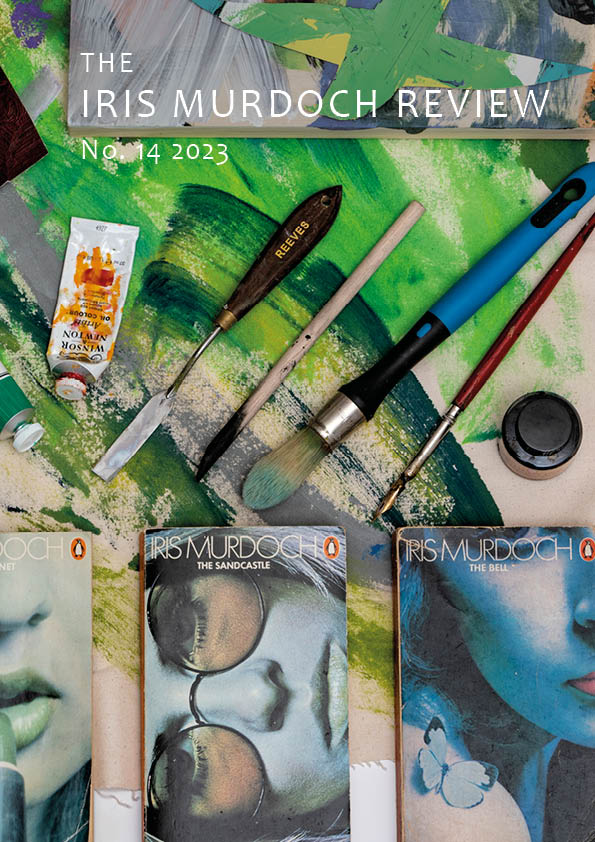The Iris Murdoch Review, No. 14 – Editorial Preface
The influence and impact of Iris Murdoch’s work is increasing exponentially each year and the Iris Murdoch Review likewise seems to grow with each issue. Issue no. 14 contains a wide-ranging collection of essays, reviews and reports variously connected by specific features. We begin with celebrations of Murdoch at home and abroad, then move on to America, art, philosophy and literature – specifically by women writers: a set of topics that encapsulates Murdoch’s life of working, writing and travelling.
Nowhere closer to home could Iris Murdoch be celebrated than at the Oxford house she shared with John Bayley. Thanks to Audi Bayley’s kind permission and the work of Anne Rowe, Norah Perkins (Murdoch’s literary agent at Curtis Brown) and the generosity of the Iris Murdoch Society, a blue plaque in Oxford has been added to those in Blessington Street, Dublin and Badminton School, Bristol. We are delighted to publish the text of the address given on the occasion by Murdoch’s friend and biographer, Peter J. Conradi, with an image of the new plaque. Further afield, Montse Figuerola’s account of a performance of a Catalan translation of the first play in Acastos publicises the work of the Iris Murdoch Seminar group at the University of Barcelona, and a report on the 2022 online conference by Fiona Tomkinson and Chicho Omichi demonstrates that the Iris Murdoch Society of Japan continues to flourish under Paul Hullah’s leadership.
This issue opens in customary fashion with a previously unpublished piece of original Murdoch material, a transcription of two talks given by her and John Bayley at Tulane University in 1987. It offers a rare view of how well Iris and John worked together as an academic double act, as well as being richly informative about their literary and philosophical views. Gratitude is due to Daniel Read for his painstaking labour of transcription. The theme of America continues with an extended interview with Cheryl Bove of Ball University, an early Murdoch scholar whose major contribution is deservedly recorded and celebrated here in the course of exploring Murdoch’s relationship with the USA in her life and in her fiction. Meredith Trexler Drees, co-convener with Miles Leeson, reports on the success of the online ‘Iris Murdoch: Transatlantic Ties’ conference, the first major USA-based Murdoch-focused event since 2001.
Art, and the making of it, features significantly in this issue. The cover image is from an exhibition by Kevin Petrie who has written a reflection, ‘Other Journeys’, on the influence of Murdoch on his creative work: four paintings inspired by her novels accompany his account. In the final section of this issue, ‘Friendships and Connections’, Rebecca Moden discusses the lives and work of two painter friends of Murdoch: the Canadian artist Alex Colville, and Murdoch’s portraitist Tom Phillips, who died in November 2022. We are glad to offer this homage to Phillips and it is good to see that the newly refurbished National Portrait Gallery has hung his iconic painting of Murdoch again – a sign of her continuing cultural importance. Moden’s scholarship in this field is surveyed in Avril Horner’s review of her monograph, Iris Murdoch and Harry Weinberger: Imaginations and Images, recently published in Palgrave Macmillan’s ‘Iris Murdoch Today’ series. Dayna Miller’s report on the past year’s activities and acquisitions in the Iris Murdoch Collections includes news of a recent exhibition, ‘Making Good’ by Matthew Richardson, based on the tantalising notes for The Bell that Murdoch scribbled in the end pages of her copy of Colin Wilson’s The Outsider.
Scott Moore’s ground-breaking essay ‘Was Iris Murdoch a Phenomenologist?’ forms the core of the philosophical theme in this issue. This offering is timely as Murdoch’s Heidegger monograph is soon to be published by Oxford University Press and will doubtless engender lively philosophical debate. Murdoch as philosopher was to the fore during the recent 'Wartime Quartet' conference at Durham University on which Daniel Read reports, and Murdoch’s influence is made plain in Rachel Handley’s review of Sabina Lovibond’s Essays on Ethics and Culture. Panning out from Murdoch, or indeed the Quartet, to fill out the background to the work of these extraordinary women is A Terribly Serious Adventure: Philosophy at Oxford 1900–60 by Nikhil Krishnan, serendipitously reviewed for us by Lovibond.
Last, but of course far from least, we turn to the theme of literature, and to women writers across the centuries. In response to Rachel Cusk’s article, ‘On Iris Murdoch as a Woman Writer’, in the previous issue of the Iris Murdoch Review, Lucy Bolton offers a spirited rejoinder, ‘Iris Murdoch May Not Be a “Women’s Writer”, but She Certainly Writes for Me’, opening up a debate that will continue as Murdoch’s work is assessed from highly diverse feminist perspectives. Her fiction is juxtaposed with that of other female novelists, first in Frances White’s essay on Murdoch’s relationship with the work of Jane Austen – reflected in the Tulane talks given by the Bayleys – and second in Janfarie Skinner’s account of the undervalued novels of Murdoch’s colleague and friend Rachel Trickett, whose centenary falls in December of this year. This is a fitting tribute to another remarkable Oxford woman. Rob Hardy’s 2022 Iris Murdoch Society Christmas lecture proposed an innovative feminism-influenced reading of The Unicorn, focused through the lens of Marian Taylor, as Maria Peacock reports, and Anne Rowe’s public lecture, reported by Frances White, brought out the importance of an early woman writer, Dame Julian of Norwich, to Murdoch’s neo-theology and novels. In her review of The Subversive Simone Weil: A Life in Five Ideas by Robert Zaretsky, Silvia Caprioglio Panizza picks up the contentious point well made in Bolton’s riposte to Cusk, highlighting the dangerous tendency, when writing about the life of a woman intellectual, of focusing on her personal life rather than on her output. Despite containing some inflammatory material this risk was avoided in Iris Murdoch and the Literary Imagination, edited by Miles Leeson and Frances White for the ‘Iris Murdoch Today’ series, which is given an appreciative review by David Fine, pertinently identifying future areas of research for Murdoch scholars.
The final element in Murdoch studies which we want to feature in this preface is the increasing outreach towards the rapidly expanding number of Murdoch readers and students across the world. Mention has been made of work in Barcelona and Tokyo; added to this Richard Moon reports on Sarah Chihaya’s 2022 online classes from the 92nd Street Y in New York, which analysed four novels from Murdoch’s middle period. Moon (and other members of the IMS) also attended the Literature Cambridge lecture-seminars given by Miles Leeson, whose trumpet I wish to blow as he is too modest to draw attention to his own achievements and hard work in the Murdoch community. Leeson has created three themed series each based on four Murdoch novels: on London in 2022, on the Gothic in 2023, and on Love, forthcoming in 2024. The Iris Murdoch podcasts which he hosts and edits – of which there are now well over forty – are being listened to on all continents except Antarctica and have attracted more than 20,000 listeners over the past year. As director of the Iris Murdoch Research Centre and leader of the Iris Murdoch Society, Leeson’s work too should be acknowledged and celebrated, and I am grateful for the privilege of writing this preface on behalf of the editorial team, both to take one task off his desk and to express our appreciation to him.
Looking to the future, the podcasts continue apace; many more works are in the pipeline for the ongoing ‘Iris Murdoch Today’ series; the first conference on Iris Murdoch and the East is imminent, as is the 25th Annual Conference of the Iris Murdoch Society of Japan this November; the Iris Murdoch Society Christmas lecture has become an annual feature; and, as well as the biennial Iris Murdoch Conference at the University of Chichester in September 2024, the first ever Iris Murdoch conference at Paris's Panthéon-Sorbonne University will take place in April 2024. We should all recognise and rejoice in the flourishing of Murdoch studies as we approach the end of the first quarter of the twenty-first century.
Finally, we are grateful to Kevin Petrie for use of his artwork; to Leo Phillips for permission to reproduce his photograph of his father, Tom, painting Murdoch’s portrait; to the Iris Murdoch Seminar group at the University of Barcelona for permission to reproduce the poster for their performance; to Heather Robbins for producing the Review; to our hard-working editorial team, our authors, reviewers and reporters; and ultimately to our readers who make all the work worthwhile.
University of Chichester, August 2023

